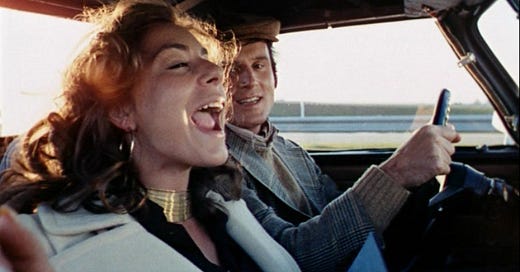“No pecan pie? NO PECAN PIE?”
Exquisitely uncomfortable, The Heartbreak Kid’s pecan pie scene, in which Charles Grodin’s Lenny, just a few days into his honeymoon, informs his bride Lila (Jeannie Berlin) that he wants a divorce, is a scene of painful comic genius. Grodin loudly displaces onto the pie shortage his breathtaking moral recklessness, a hutzpah that will bring him into the heart of WASP America as he wins the hand of the 22-year old Cybill Shepherd, a midwest Aphrodite at the peak of her radiance. (In fact, Shepherd first appears in the movie haloed by the blinding sun as if she has just emerged from waves.)
The Heartbreak Kid is one of the indispensable movies of the Jewish encounter with WASP America. Having divorced his wife and following Shepherd to Minnesota, Grodin must overcome the stern opposition of his blonde goddess’s wealthy father, played wonderfully by Eddie Albert, who understandably does not want his daughter marrying a sports equipment salesman who began their courtship during his honeymoon. But Albert is no match for Grodin, who discovers that he can talk himself, compulsively, past any boundaries, even past his own sense of what he wants in life.
The Heartbreak Kid boasts a screenplay by Neil Simon, with credit given to a minor short story by Bruce Jay Friedman. But the achievement of the movie is that of director Elaine May, who cultivates an edgy pathos that deepens and darkens the comedy. Even when the characters are comic types, May probes and draws out their human complexity.
Jeannie Berlin (who is May’s daughter) is, for instance, more than a mere stereotype of a whiny Jewish wife, sexually withholding before marriage and sexually boring after. Berlin’s Lila is fascinatingly corporeal. She loves food, which often winds up on her chin. Her skin burns in the Miami sun, and she slathers it with cold cream. You know that she belches. She will bear children and get stretch marks, will age and die.
All so different from Shepherd’s flawlessness, a contrast seen as well in the movie’s two weddings. First is the Jewish wedding of Grodin and Berlin, a homey affair with folding chairs in a living room, a hora banged out on an upright piano. At the end is the solemn church wedding of Grodin and Shepherd, beneath a cross, the officiating priest pronouncing their marriage as a symbol of “the mystical union that is betwixt Christ and His Church.”
Grodin has done it. Yet we leave him at the end sitting alone on a sofa at his wedding reception, staring uncertainly into space much like Dustin Hoffman and Katharine Ross at the end of The Graduate, a movie by May’s former improv comedy partner Mike Nichols. The Jew gets what he wants. He pounds on the door of the WASP establishment, and is let inside. But what happens now that he’s in?
I’m hardly the first person to praise May’s talent as a director, an underused talent that, with the exception of The Heartbreak Kid, never found its proper outlet. There was the offbeat comedy she wrote and directed, A New Leaf, with Walter Matthau and May as the leads. It has its moments (“You’re not by any chance related to the Boston Hitlers?”) but is too goofy and implausible to be satisfying. Her Philly gangster movie Mikey and Nicky, with Peter Falk and John Cassavettes, is an homage to Cassavettes’s early avant-garde films—a tour de force of nervous improvisation but tiring to sit through.
Unfairly, May has been most associated with the financially disastrous movie Ishtar. I’m among those who see the movie as simply miscast, with Dustin Hoffman and Warren Beatty bringing far too heavy a weight of personality to roles that call for the merely genial idiocy of, say, Will Ferrell and Steve Carroll.
The Farrelly brothers’ unwatchable 2007 “remake” of The Heartbreak Kid with Ben Stiller is better left unmentioned. But Stiller shows up in a more widely known instance of the afterlife of May’s movie: the clear echoes of her Minnesota dinner scene, another uncomfortable comic tour-de-force (“this is a totally honest meal”), in the 2000 movie Meet the Parents, with Stiller in the Grodin role of Jewish interloper in WASP America.
Meet the Parents would spawn two sequels, a highly lucrative franchise that runs on the fumes of the Jew-WASP dichotomy. By the time Meet the Parents was made, that opposition was already little more than a stale Hollywood conceit, an expression of nostalgia for when Jews were counter-cultural. How detached from actual sociology the trope had become is seen in the casting of Robert De Niro as WASP patriarch.
The Jews have long since arrived in America, and it is not heartland Christians who want to drive them out.






